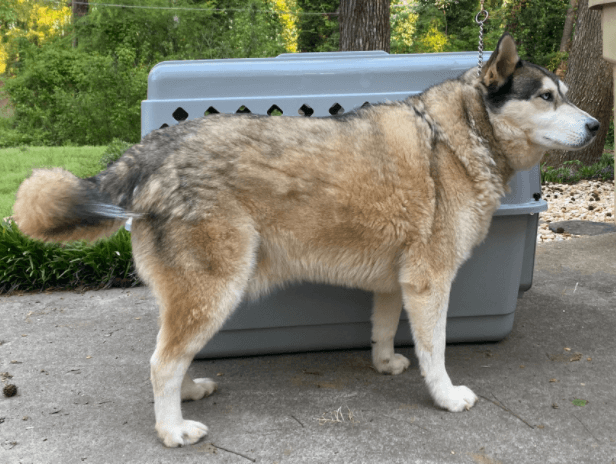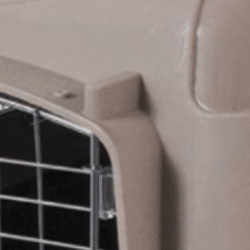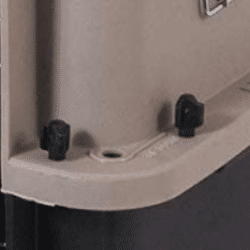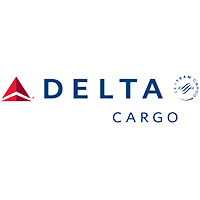Pet Approved Crates
Crates must be made of hard, non-collapsible, leak proof material (no holes on bottom half of crate). The crate must be solid and able to endure weight. No wheels allowed. Plastic screws, clamps, or slide locking side fasteners are not acceptable. Crates must have ventilation (holes) on all four sides.
Crate Requirements
- Your pet must be able to stand up, turn around, and lay comfortably in the crate. When standing, there must be at least 3 inches of space above the head. When laying, an animal should not have to curl its front legs to lie down.
- Crates must be made of hard, non-collapsible, leak proof material (no holes on bottom half of crate). The crate must be solid and able to endure weight.
- No wheels allowed.
- Plastic screws, clamps, or slide locking side fasteners are not acceptable.
- Crates must have ventilation (holes) on all four sides.
- If your pet is timid, you can tape or mount a burlap flap to the top of the crate that can hang in front of the door to help them feel more secure (primarily for cats).
- The door mesh must be metal, not plastic. Locking pins must extend at least 1.6 cm above/below the door opening.
- No top loading/opening doors allowed.

Water and Food Dishes
- A food and water dish (one for each) much be mounted inside of the crate.
- If you purchase these items, make sure they are large enough for your animals, as most are not.
- If possible, freeze water into the bowls the night before travel or bring ice to check in.
Flooring & Bedding
The bottom of the crate must be lined with non-toxic absorbent bedding. We recommend lining the bottom of the crate with cardboard, such as from a broken-down box, then placing a blanket or towel on top of the cardboard.
Crate Size Requirements
Correct Crate Size

Incorrect Crate Size

Crate Requirements you need to know
✗ Not Allowed

Not allowed due to locking pin not extending 1.26cm

Clamps are not allowed – unless they are in addition to screws and bowls
✓ Allowed

Allows locking pin to extend 1.6cm

Screws and bolts are required
Household Pet Transport
You treat them like family, and so do we. Book with Delta Cargo for fur-class pet transport.
Click here for information about commercial animal shipments.
What We Carry
– Dogs
– Cats
– Birds
– Reptiles
– Amphibians
See our Restricted Animals page to learn more.
Protection, Care and Comfort
Delta Cargo is committed to the safe and reliable transport of all animals in our care. We are the only airline with an experienced veterinarian on staff. Throughout transport, our trained ground handlers offer personalized care, and our Cargo Control Center agents actively track every step of the animal’s journey. Temperature-controlled vans and holding areas in select stations prevent exposure to extreme temperatures.
Safe and Simple
1) Confirm your pet’s eligibility for travel (see Regulations and Restrictions below).
2) Confirm you have a compliant crate for your pet (see Crate Requirements below).
3) Make your reservation on delltacargo.com.
4) Gather all the required documents before the travel date (see Documentation below).
5) Drop off your furry friend at one of our locations.
6) Pick up your pet at the destination locations.

Pet Embargo Currently in Effect
Delta Cargo has placed a temporary embargo on pet shipments globally. However, an exception is made for Active US Military or Foreign Service Officers traveling with permanent change of station orders.
To make a U.S. Military or Diplomat booking, please contact the Delta Cargo Customer Service Center or Live Animal Desk. You will be required to provide a copy of the permanent change of station orders.
Regulations & Restrictions
- Delta has the authority to deny animal shipments that do not comply with all regulations for the destination state or/and country.
- Delta may deny shipments pending further review at acceptance and/or re-accommodate shipments for a different date or time while seeking answers.
- Non-compliance may incur additional fees, as your pet can be denied entry and required to be returned to its origin or placed into mandatory quarantine.
Regulations
- To ensure compliance with IATA Regulations, visit Traveler’s Pet Corner
- Location-Specific Requirements
- Pet travel is limited to one connecting city.
- Domestic – pet travel requirements are more stringent for the following US locations:
- International
- When traveling abroad, customers MUST comply with all regulations/restrictions and with the animal entry requirements of the destination state or country. Failure to comply can result in additional fees and/or denied entry for the pet, which may be returned to origin or placed in mandatory quarantine.
- To review the Pet Travel Guidance offered by USDA APHIS and ensure compliance prior to travel, click here.
- International shipments of Product Code PET (except for Military/FSO traveling on active-duty permanent change of station orders) will require the use of a professional pet shipper who is a member of the International Pet and Animal Transportation Association (IPATA).
- A list of IPATA members may be found at ipata.org.
- For detailed USDA pet import/export information, click here.
- For CDC dog importation regulations, click here.
- Dogs from high-risk countries may be imported only with CDC’s advance written approval (CDC Dog Import Permit) including dogs imported from a country NOT at high risk if the dogs have been in a high-risk country during the previous 6 months.
- For information about clearing customs in AMS or CDG, click here Open in Pdf.
- Age Requirements
- Dogs and cats must be at least 12 weeks of age.
- Animals must be fully weaned and self-feeding and be of sufficient strength and age to travel safely.
- For safety reasons, a mother (dam) may not travel together in the same kennel with her young.
- Please review our Temperature Policy.
- Sedation Policy: Dogs or cats that have been sedated or tranquilized are prohibited. According to the American Veterinary Medical Association (AVMA), the sedation of dogs or cats during air transportation can increase the risk of heart and respiratory conditions.
- To import dogs to the US for commercial sale/adoption, please review APHIS regulations.
Restrictions
- Delta Cargo prohibits the following:
- Interline live animal shipments-the transport or transfer of live animals to another air carrier.
- Shipping live animals as DASH.
- Delta will not accept or transport of any animal that:
- is sedated or tranquilized
- is on the Restricted Breed List
- is obviously ill, injured or in physical distress.
- requires medication to be administered during travel.
- is displaying obvious signs of aggression.
- is making determined efforts to escape their travel crate.
- is deceased, and its remains are untreated.
- Delta will not accept pets when:
- Temperature limits are exceeded.
- Required travel documents are not provided (see Documentation drop-down).
- Pets are in non-compliant travel crates Open in Pdf.
- Shipments that do not comply with USDA Animal Welfare Regulations Open in Pdf, IATA Live Animals Regulations, CDC Importation Regulations or US TSA Regulations.
- Medical recommendations
- Please ensure your pet is medically fit for air travel.
- Review your pet’s medical history when you obtain the health certificate from your veterinarian (see Documentation drop-down).
- Pets with underlying medical conditions (i.e. heart disease, lung disease, diabetes, seizure disorders), in the 3rd trimester of pregnancy, with anxiety disorder, or that have recently had surgery can be impacted by air travel.
Crate Requirements
- Review the IATA Open in PdfCompliant Travel Crate Requirements Open in Pdf for dogs and cats prior to travel.
- Review Delta’s Crate Requirements Open in Pdf.
- Crate Size
- Crate must be large enough to allow the dog or cat to comfortably sit, stand or turn around without touching the sides/top of the crate.
- Click here Open in Pdfto read what crate size is compatible with the aircraft on which your pet will travel.
- Review items allowed Open in Pdf inside crate or on pet:
- Certain items are unsafe if worn or placed inside/outside the crate. Prohibited items must be removed before the shipment is accepted. If these items cannot be removed or if any shipment does not comply with these requirements, the shipment will be denied pending further review.
- Absorbent bedding must be present inside the crate.
- Water/food containers must be attached to the inside of the crate door.
- Two dogs or cats allowed per crate, ONLY if:
- both animals are 12 weeks to 6 months of age.
- each animal weighs less than 20 lbs.
- the crate is large enough for two animals.
- Acclimate your pet to confinement in the crate prior to shipping; note that it may take weeks.
Documentation
- Shipper’s Certification for Live AnimalsOpen in Pdf
- Air waybill from your booking confirmation (must contain common name, quantity of animals per container in the shipment and 24-hour emergency contact telephone number for the shipper).
- Domestic Health Certificate (obtained from and completed by your veterinarian)
- Must be issued by a USDA-accredited veterinarian within 10 days of travel.
- Electronic certificates of veterinary inspection with digital signatures required for most US states; APHIS 7001 form accepted for travel to Hawaii.
- OR International Health Certificate (obtained from and completed by your veterinarian)
- Issued by a USDA-accredited veterinarian and endorsed by APHIS Veterinary Services within 10 days of travel.
- OR Issued by an active-duty military veterinarian within 10 days of travel (endorsement by APHIS Veterinary Services not required).
- Special Circumstances
- If the temperature is forecast to be between 20°F (-7°C) and 45°F (7°C) during the time an animal will be in any station during transport, a Certificate of Acclimation Open in Pdfmay be required.
- Must be signed by a USDA-accredited veterinarian, stating the lowest limit between 20-45 °F that the pet can travel.
- Document cannot be used to circumvent Delta’s established temperature limits.
- If importing a dog to the US from a country the CDC has identified as high-risk for rabies, you can apply for an Import Permit.
- If the animal is in the 3rd trimester of pregnancy, we require a letter from a licensed veterinarian stating that the pet is safe to travel.
- If the temperature is forecast to be between 20°F (-7°C) and 45°F (7°C) during the time an animal will be in any station during transport, a Certificate of Acclimation Open in Pdfmay be required.
Booking, Drop-off, Acceptance & Recovery Times
- Click here Open in Pdf to view drop-off, acceptance & recovery times. Refer to the column titled “Specialized Live,” product code PET.
- Do I need to hire a professional shipper?
- Does the cost vary?
Most likely you will need to hire a pet transportation company. Most US based airlines require each international pet reservation to be made using an IPATA member. Many of the European airlines require a credit account to be established in order to make these reservations, which a person cannot obtain without a business purpose and record. Other airlines require a TSA known shipper to make the reservation. If you have found an airline that will allow you to make your own pet reservation, this is only recommended if the destination country import requirements are very minimal. Please keep in mind that pet shippers regularly receive last-minute frantic calls from people who have tried to ship their own pet, which ultimately results in higher fees, delays, and re-completion of tests and paperwork.
The cost of transport will be highly variable based on your location, destination country, animal type, breed, and weight. Many airlines and destination countries require the pet to travel as manifest cargo, so the routing options and pricing are usually quite a bit different than for passenger flights. Costs to consider are the vaccinations and lab testing required, health certificate appointment, USDA endorsement of documents, the crate, the airline booking, fees to the shipping agent, and customs fees at the destination airport. If your transport is commercial (transfer of ownership of a pet), you may also need to pay taxes in the destination country.
